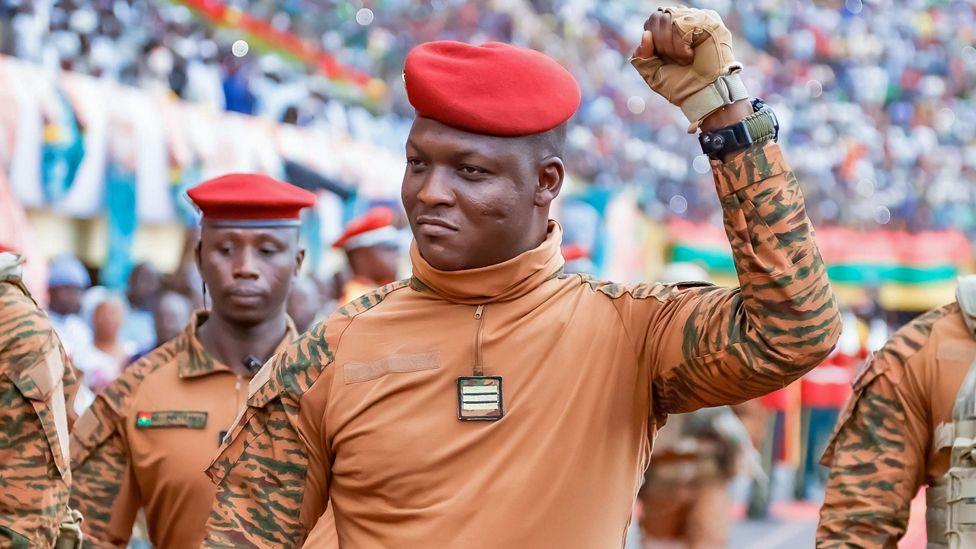Capt Ibrahim Traoré: The Controversial Leader Reshaping Burkina Faso’s Identity
At the helm of Burkina Faso is a figure steeped in charisma and ambition—Captain Ibrahim Traoré, a 37-year-old military leader whose rhetoric and actions echo a strong pan-Africanist ideology. Traoré, who came to power in a 2022 coup, has positioned himself as a defender of African autonomy against what he perceives as Western imperialist influence, particularly from former colonial powers like France.
His message of self-determination and economic independence has garnered attention across the continent. Advocates liken him to iconic African leaders such as Thomas Sankara, the late Burkinabé revolutionary known for his socialist policies and commitment to national sovereignty. Beverly Ochieng, a senior researcher at Control Risks, remarked, “Traoré’s impact is monumental. He evokes comparisons to historical figures while addressing contemporary challenges faced by African nations.” She noted a growing skepticism among Africans towards Western relations, particularly regarding persistent poverty amidst abundant resources.
A Shift towards Alliances
Since taking control, Traoré’s administration has fostered a new partnership with Russia, distancing itself from past associations with France. This shift has seen the inclusion of a Russian paramilitary brigade and the introduction of leftist economic reforms designed to prioritize local participation in the country’s wealth. A primary focus has been the establishment of a state-owned mining company that requires foreign enterprises to cede a 15% equity stake to Burkina Faso and facilitate the transfer of skills to locals.
The junta’s aggressive maneuvers have sparked reactions from Western companies. Sarama Resources, an Australian firm, initiated arbitration due to the revocation of an exploration license, while two gold mines previously owned by a London-listed company were nationalized. Enoch Randy Aikins from the Institute for Security Studies commented, “Traoré’s transformative policies have rapidly expanded his appeal across Africa, making him perhaps the continent’s most admired leader.”
Impact of Social Media
The activist leader’s popularity has surged in part due to strategic social media campaigns, often elevating him using AI-generated videos featuring prominent music artists who unwittingly associate him with revolutionary fervor. An influential moment occurred when Traoré addressed the 2023 Russia-Africa summit, urging fellow leaders to reject perceived subservience to Western powers, an address that was amplified by Russian media.
His recent attendance at commemorative events in Russia further solidified his narrative of resistance against terrorism and imperialism. Acknowledging the widespread admiration for his defiance, Ochieng mentioned his efforts resonate well with individuals who have experienced the historical impacts of colonialism and systemic racism.
Rising Adversity and Criticism
Despite his growing support, Traoré faces significant challenges. Critics have pointed out his failure to effectively combat a decade-long Islamist insurgency contributing to increasing instability across the region. His regime has also been criticized for stifling opposition, torturing dissent, and retaliating against critics by sending them to the forefront of military operations.
International response has been equally mixed; while the IMF and World Bank recognized some economic progress amid a turbulent climate, relations with France and the United States remain strained. General Michael Langley’s comments on the junta’s motives for utilizing gold resources have fueled further animosity and prompted massive public support events in Burkina Faso.
Future Prospects
As the young leader continues to energize a war-torn population, analysts highlight the need for lasting solutions that foster peace and governance rather than echoing historical pitfalls of military rule. “To ensure a meaningful legacy, Traoré must prioritize stability and institutional development,” Aikins noted, cautioning against a pattern of personalizing governance.
| Aspect | Details |
|---|---|
| Leadership Style | Charismatic and pan-Africanist |
| Key Alliance | Russia instead of France |
| Economic Policy | State-owned mining initiatives |
| Public Perception | Highly popular among youth |
| Challenges Faced | Persistent insurgency and political dissent |
As Captain Ibrahim Traoré continues to navigate the complex dynamics of governance, his journey reflects both the aspirations and challenges of a continent grappling with its identity and future.


